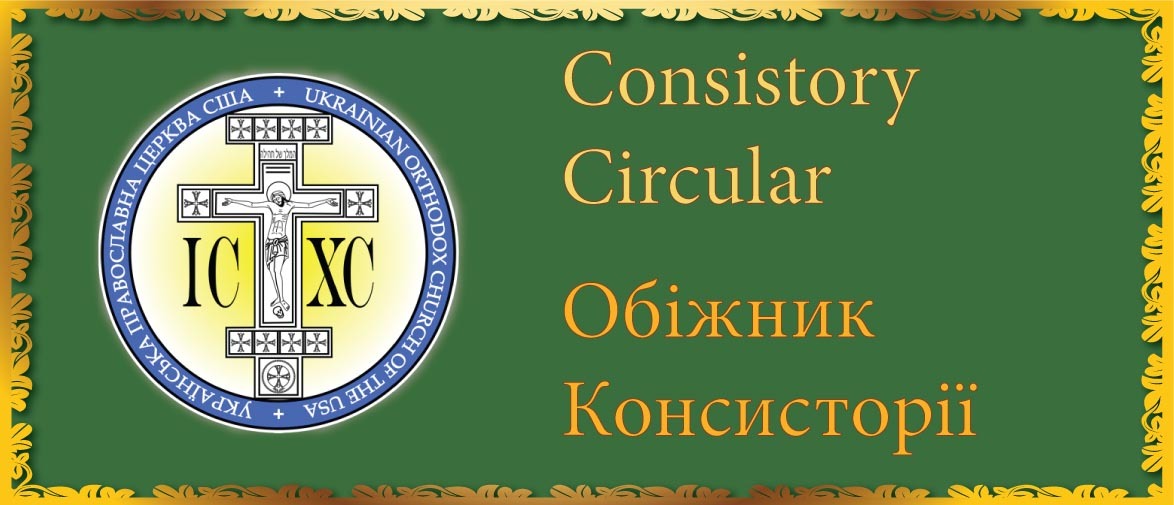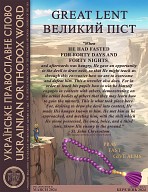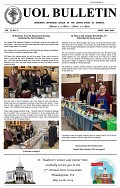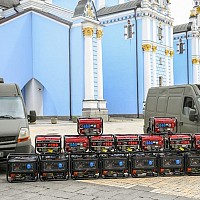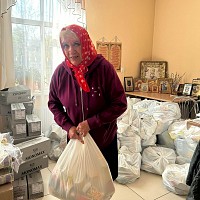UKRAINIAN ORTHODOX CHURCH OF THE USA
CONSISTORY OFFICE OF PUBLIC RELATIONS
PRESS RELEASE
The Great Lent Epistle of the Permanent Conference
of Ukrainian Orthodox Bishops Beyond the Borders of Ukraine
“Thomas said to Him, ‘Lord, we do not know where You are going, and how can we know the way?’Jesus said to him, ‘I am the way, the truth, and the life.No one comes to the Father except through Me.” (Jn 14:6)
Beloved in the Lord, Reverend Clergy!
Dear Brothers and Sisters!
Once again, that time has come in our Orthodox Church calendar when we embark on a spiritual passage to the capital city of Jerusalem. Over the course of six weeks of travel, we prepare ourselves to lay down palm fronds to greet our Lord Jesus Christ for His triumphal entrance into this holy city as the King of the Universe, Who would undergo severe trials and death for our sake at the hands of those who saw Him as a mere political leader. But the Lord said that His Kingdom is not of this world. In this final week in Jerusalem, we desire to draw closer to the Lord through our worship in the Passion Week services, although those He chose Himself distanced themselves from the Lord, denying they were His disciples (Jn 18:17). Having purified ourselves and made ourselves worthy, we shall come to the end of our voyage to greet with radiant joy, like Mary Magdalene, the Resurrected Christ. But the road is long and we have only just begun. This road is called Great Lent.
Christ tells us that He is the Way, but He did not leave us alone to struggle down this road to eternal life. He gave us a spiritual guidance system, a GPS so to speak, along with a tool box of ascetic practices. If we follow these guideposts and use the tools as instructed, we will arrive at our destination – salvation and eternal life in the Kingdom of God. Great Lent and the preparatory weeks before it – the Sundays of the Publican and Pharisee, the Prodigal Son and the Last Judgment – are part of this roadmap. Prayer, repentance, fasting and acts of mercy are part of this tool kit.
For centuries the Holy Orthodox Church has continued the practice of the forty day fast instituted by Jesus Himself after His baptism in the Jordan River before beginning His mission. The Gospel of Matthew teaches how Jesus was tempted in the desert by the devil who promised all kinds of riches which Christ rejected. Notably, the Lord was first tempted with food for He was hungry. The Lord’s rebuke, “Man shall not live by bread alone” (Mt 4:14), is echoed by generations of saints who caution us that gluttony is the gateway through which we are tempted to other, greater sins of pride, avarice and lust for power. For this reason our food restrictions of the fast help us against many kinds of temptations. Christ left instructions on how to fast, “Moreover, when you fast, do not be like the hypocrites, with a sad countenance ...they may appear to men to be fasting. Assuredly, I say to you, they have their reward. But you, when you fast, anoint your head and wash your face, so that you do not appear to men to be fasting …and your Father who sees in secret will reward you openly.” (Mt 6:16-19)
We have just witnessed the world’s athletes achieve great sporting heights at the Winter Olympics after long training for optimal physical strength and mental character. Great Lent can be regarded as a time for spiritual exercises or training for a “spiritual Olympics”. The fast period requires similar enhanced spiritual exercises of prayer, fasting, kindness to others and merciful works to renew our soul and restore our relationship with God, our family life and our communities.
We commence the Great Fast with the poignant lamentations of the Forgiveness Vespers. The words of the prayer of St. Ephraim the Syrian penetrate our entire being: “O Lord and Master of my life, take from me the spirit of sloth, despondency, lust of power, and idle talk; But grant rather the spirit of chastity, humility, patience, and love to Your servant.” What impedes our relationship with God? In this prayer, St. Ephraim draws attention to the four qualities that stand between us and God – laziness, idle talk, despair and greed for power.
The first barrier to God is idle talk. The ability to speak is one of the greatest gifts from God that sets us apart from other forms of creation. The Holy Fathers wrote repeatedly that what comes out of a person’s mouth is of much more concern than what enters. When this gift of speech is used to spread the Truth of God, then it follows its true purpose. When we use language for destructive purposes, such as gossiping, judging others and slander, then we are no longer serving God but satan. Moreover, the Gospels teach us that we are responsible for our words before God and will come to account for them at the judgment seat of Christ. “But I say to you that for every idle word men may speak, they will give account of it in the Day of Judgment.” (Matt. 12:36) Idle words have considerable power, equal to deeds, and we should be very careful how we use them towards each other.
The second impediment is that we are lazy – known as idleness or slothfulness in the writings of the Holy Fathers. We may descend to such a state that we take the attitude – be it in our parish life, society, family or personal life: “Let someone else do it,” or “is it really necessary?” or “leave it as it always was.” “For just as nothing stops an earnest man, one whose soul is upright and awake, so anything at all will stand in the way of the half-hearted and the lazy,” St. John Chrysostom tells us. The Church Fathers also caution us that idleness is the fertile soil of the devil. God created human beings to work for a purposeful life – even before the fall. “The Lord God took the man He formed and put him in the garden to tend and keep it.” (Gn 2:15) Modern science has also come to this conclusion that the human body, mind and spirit must be constantly engaged or otherwise will decline. This state of mind and spirit, as the result of laziness, leads us to fear change and we become apathetic to our surroundings – with serious spiritual consequences. “Whoever knows what is right to do and fails to do it, for him it is a sin.” (Jam 4:17)
A third quality noted by St. Ephraim is despair, or hopelessness, which we also know as depression. Sometimes, we become suffocated by the thorns of hopelessness. Our fast-paced lifestyles that place an overreliance on human abilities leave us overwhelmed by the demands of our work, study and family obligations. Yet, we should not despair. We should not allow ourselves to fall into a state of despondency and hopelessness. “Rejoice in hope of the glory of God. We also glory in tribulations, knowing that tribulation produces perseverance; and perseverance, character; and character, hope. Now hope does not disappoint, because the love of God has been poured out in our hearts by the Holy Spirit who was given to us.” (Rom 5:2-6) We must remember to give up our burdens to the Lord and He will help us out of His love for us.
The fourth quality is the greed for power and authority. In St. Ephraim’s prayer, we pray that God is our Lord and Master. If we disregard this, then we make ourselves the lord and master and try to force our surroundings to serve our purposes. We desire that everyone around us would bend their will to ours. Again, we begin to perceive reality in a distorted state and our personalities change so that we become unrecognizable to those who know us. The consequence of the hunger for power is that it destroys the dignity of personhood. “Happiness can only be achieved by looking inward and learning to enjoy whatever life has and this requires transforming greed into gratitude,” writes St. John Chrysostom.
What really distinguishes us from other forms of creation is that the Lord has given us free will to make moral choices. What a great responsibility! Yet, we have used that free will to make the wrong choices, just as human beings have done for generations. The cumulative effect of these erroneous choices has led the world to its current circumstances. This damaged state of the world led to the coming of the Son of God to lift the burden of the consequences of these choices from the shoulders of humanity.
Furthermore, during His mission in the world, the Lord provided us with tools to combat these erroneous decisions that are especially beneficial during Great Lent. The gift of repentance is the first step along the Way of the Lord, as St. Peter recommended to those asking practical advice about how to follow Christ. “Repent, and let every one of you be baptized in the name of Jesus Christ for the remission of sins; and you shall receive the gift of the Holy Spirit.” (Acts 3:38) St. John Climacus, who we commemorate on the fourth Sunday of Lent, defines repentance as the “reconciliation with the Lord by the practice of the virtues in opposition to sins” in order to completely shift our way of being. Repentance is so important that it was the first message Jesus began to teach after His own fast in the desert, “Repent, for the kingdom of heaven is at hand.” (Mt 4:17)
The gift of tears that accompanies repentance is often called the second baptism. In the Great Canon of St. Andrew of Crete, which we serve during the first week of Great Lent, we witness his deeply personal cry of repentance, “I have sinned, O Savior, have mercy! Awaken my mind to conversion, accept me who repent, have compassion on me as I cry: Against You only have I sinned and acted lawlessly; have mercy on me.” (Song 8)
Let us make use of the opportunities God has given us during this Lenten period to draw closer to Him. Let us absorb the themes of each week of the fast and listen to the words of the saints serving as examples for us – St. Gregory Palamas, St. John Climacus, St. Mary of Egypt, St. Andrew of Crete, among others. Let us strive to participate in some of the special services of the Lenten period and take up their meanings into our hearts: The Liturgy of the Pre-Sanctified Gifts, the Great Canon of St. Andrew of Crete and the Passia, or Passion of Christ, service. At the same time, we lose any benefits of the fast if we simply focus on ourselves. Instead, let us lend help to those in need around us. May we increase our prayers for our family, friends and parish community, especially for our enemies and those who have fallen away from Christ’s Path. Let us particularly intensify our prayers for our brothers and sisters in Christ in our spiritual homeland of Ukraine in their struggle for human dignity and righteousness.
The Holy Orthodox Church has provided us with an opportunity for quiet introspection to evaluate the priorities in our life and to strive for spiritual growth in Christ. As we embark upon this Lenten journey, it is also a time to renew ourselves as Orthodox Christians. Upon baptism we assumed the obligation of sharing the Good News of Christ with others, of defending the Holy Orthodox faith from persecution and of living a Christ-centred life of love for others. Keeping the true fast means struggling along such a straight and narrow road. This six-week voyage that we have begun entails striving for humility and contrition before God in our repentance, seeking mutual forgiveness from others and contemplating our renewal in our prayers. Let us open our hearts to let in that which is eternal, that which is Truth and not be blinded by the temporal world around us. Where there is light there is hope. Through His life and suffering for our salvation, we gain renewed hope in the light of Christ’s glorious victory over death and in eternal life.
May our All-Merciful and Almighty Lord assist us on our travel through this Great Fast with humility and reverence so that we may be worthy to greet the glorious Resurrection of our Lord and Saviour Jesus Christ!
With hierarchical blessings,
† YURIJ, Metropolitan
Ukrainian Orthodox Church of Canada
† ANTONY, Metropolitan
Ukrainian Orthodox Church of the USA
Locum Tenens Ukrainian Orthodox Church in Diaspora
† IOAN, Archbishop
Ukrainian Orthodox Church in Diaspora
† JEREMIAH, Archbishop
Ukrainian Orthodox Eparchy of Brazil and South America
† ILARION, Bishop
Ukrainian Orthodox Church of Canada
† ANDRIY, Bishop
Ukrainian Orthodox Church of Canada
† DANIEL, Bishop
Ukrainian Orthodox Church of the USA
UKRAINIAN ORTHODOX CHURCH OF THE USA
CONSISTORY OFFICE OF PUBLIC RELATIONS
PRESS RELEASE
Великопісне Послання
Постійної Конференції Українських Православних
Єпископів поза межами України
“Фома сказав Йому: Господи! Не знаємо, куди йдеш; і як можемо знати путь? Ісус сказав йому: Я є путь, і істина, і життя; ніхто не приходить до Отця, як тільки через Мене”. (Ін 14:6)
Улюблені у Господі Священнослужителі!
Дорогі браття і сестри!
Ось знову настав той час в календарі Православної Церкви, коли ми вступаємо на духовну прощу в столицю Єрусалим. Протягом шести тижнів цієї подорожі, ми готуємося вітати Господа нашого Ісуса Христа пальмовими віттями на Його тріумфальний вхід в це святе місто як Цар Всесвіту, і Хто мав пройти суворі випробування і смерть заради нас від рук тих, хто вбачив в Ньому простого політичного лідера. Але Господь сказав, що Його Царство не на цьому світі. В Єрусалимі під час Страсної седмиці ми бажаємо наблизитися до Господа через наше поклоніння в богослужіннях Страсної седмиці. Хоча ті, кого Він Сам обрав апостолами віддалилися від Господа, зрікаючись що були Його учнями (Ін 18:17). Очистивши себе і зробивши себе гідними, ми прийдемо до кінця нашої подорожі, щоб вітати Воскреслого Христа зі сіяючою радістю, як Марія Магдалина. Але дорога довга, і ми тільки почали її. Ця дорога –Великий Піст.
Христос говорить нам, що Він є шлях. Але Він не залишив нас одних долати цю дорогу до вічного життя. Він дав нам духовну направляючу систему, свого роду GPS, разом з комплектом інструментів аскетичних практик. Якщо ми будемо дотримуватися цих орієнтирів і використовувати ці інструменти за призначенням, ми прибудемо до кінцевої точки – спасіння душі і вічне життя у Царстві Божому. Великий Піст та й попередні підготовчі тижні – Неділі про митаря і фарисея, про блудного сина і про Страшний Суд – є частиною цієї карти. Молитва, покаяння, піст і добрі діла є частиною цього набору аскетичних практик.
Протягом століть Свята Православна Церква дотримується практики сорокаденного посту, який Ісус Сам встановив після Його хрещення в річці Йордані до початку Його місії. Євангеліє від Матвія вчить, що диявол спокушав Ісуса в пустелі, обіцяючи всякі різні багатства, яких Христос відкинув. Звертаємо увагу на те, що вперше спокусив Господа їжею, бо був Він голодний. Господь сказав у відповідь, “не хлібом єдиним житиме людина” (Мт 4: 4), це знаходить свій відгук на протязі століть у святих, які попереджають, що обжерство – це двері, які ведуть до інших спокус, більших гріхів – гордості, скупості і жадоба влади. З цієї причини обмеження в їжі під час посту допоможи нам побороти багато спокус.
Христос залишив настанови про те, як треба постити, “Коли ж постите, не будьте, сумні, як лицеміри, бо вони потьмарюють обличчя свої, щоб показати людям, що постять вони. Істинно кажу вам: вони вже мають нагороду свою. Ти ж, коли постиш, намасти голову твою і вмий обличчя твоє, щоб не показувати людям, що ти постиш, але Отцю твоєму, – Який бачить таємне, воздасть тобі явно”(Мф 6:16-19).
Ми недавно були свідками того, як спортсмени світу досягали великих спортивних висот на зимових Олімпійських іграх після довгих тренувань для оптимального фізичного та психологічного стану. Великий Піст можна трактувати як час для духовних вправ або тренування до “духовних Олімпіад”, під час якого потрібно писилені “духовні вправи”, такі як наприклад, молитви, постування, милосердя, та добрі справи з тим, щоб відновити нашу душу і наші стосунки з Богом, з рідними і нашими спільнотами.
Ми починаємо Великий Піст з тужливим плачем Чина прощення на Вечірні де молитва святого Єфрема Сиріянина лунає і проникає всю нашу істоту: “Господи і Владико життя мого! Духа лінивства, безнадійності, владолюбства і пустомовства не дай мені. Духа ж чистоти, смиренності, терпеливості й любові дай мені, рабу Твоєму”. Що стоїть у відносини між нашими і Богом? У цій молитві, св. Єфрем звертає нашу увагу на чотири перешкоди, які стоять між нами і Богом. А це – лінивство, пустомовство, безнадійність і владолюбство.
Першою перешкодою на шляху до Бога – це пустомовство. Здатність людини говорити є одним з найбільших дарів від Бога, що відрізняє її від інших створінь. Святі отці неодноразово писали, що те, що виходить з уст людини є набагато важливіше, ніж те, що входить. Якщо цей дар мови використовується для поширення Слова Божого, тоді він виконує своє дійсне призначення. Коли ж ми використовуємо мову у руйнівних цілей, таких, як неправдомовство, осудження інших і наклепу, то ми більше не служимо Богові, а працуємо на диявола. Крім того, Євангелії навчають нас, що ми несемо відповідальність за наші слова перед Богом і приведуть до відповідальності за них на Суді Божому. “Кажу ж вам, що за всяке пусте слово, яке скажуть люди, вони дадуть відповідь у день судний” (Мф. 12:36). Пустомовні слова мають неабияку силу. Вони однакові з вчинками, тому ми повинні бути дуже обережні, як використовуємо їх в розмовах з другими.
Другою перешкодою є наше лінивство, що в працях Святих Отців відоме як неробство. Ми можемо допуститися до такого стану, і такого ставлення – чи то в нашому парафіяльному житті, чи то в суспільстві, сім’ї або особистому житті, що ми говоримо: “Нехай хтось інший зробить”. Або, “чи це насправді необхідно?” Або “нехай буде як було”. “Як й нічого не зупиняє серйозну людину, чия душа чесна і не спить, так й будь-що стоятиме на дорозі байдужого і лінивого”, – каже нам Св. Іоанн Золотоустий. Отці Церкви також застерігають нас, що лінивство це родючий грунт диявола. Бог сотворив людину для праці на цілеспрямоване життя – навіть ще до гріхопадіння. “І взяв Господь Бог людину, яку створив, і оселив її в саду Едемському, щоб обробляти його і оберігати його” (Бут. 2:15). Сучасна наука також прийшла до такого висновку, що людське тіло, розум і дух повинні постійно бути зайняті, бо в противному випадку зачахнуть. Цей стан розуму і духу, як результат лінивства, приводить нас до страху змін, і ми стаємо байдужими до нашого середовища –зі серйозними духовними наслідками. “Отже, хто знає, як добро робити, і не робить, тому гріх”. (Як. 4:17)
Третя перешкода, на яку вказує Св. Єфрема – відчай чи безнадія, які ми також називаємо депресію. Інколи ми задихаємося від колючок безнадійності. Швидкий темп нашого життя, який вимагає надмірну залежність від людських здібностей, перевантажує нас вимогами до нашої праці, навчання і сімейних обов’язків. Незважаючи на це, ми не повинні впадати у відчай. Ми не повинні дозволяти собі впадати в стан зневіри і безнадії. “І хвалимось надією слави Божої. І не цим тільки, але хвалимось і скорботами, знаючи, що від скорботи походить терпіння, від терпіння – досвідченість, від досвідченості – надія, а надія не посоромить, тому що любов Божа вилилася у серця нашi Духом Святим, даним нам” (Рим. 5:2-6 ). Пам’ятаймо, що ми повинні віддати всі свої турботи Господу і Він допоможе нам, бо Він нас любить.
Четверта перешкода – це жадоба влади. У молитві Св. Єфрема, ми молимося, що Бог є наш Господь і Владика. Якщо ми знехтуємо цим, то ми робитимемо себе паном і господарем і намагаємося змусити наше оточення служити нашим цілям. Ми хочемо, щоб все навколо нас підчинялося нашій волі. Ми знову починаємо сприймати реальність у спотвореному виді й наш характер міняється настільки, що станемо невпізнанними для близьких. Наслідком того прагнення до влади є те, що вона руйнує людську гідність. “Щастя може бути досягнуто тільки шляхом заглянути собі в душу, і навчитися втішатися усім, що життя дає. А це вимагає перетворення почуття жадібності в почуття вдячності”, – пише Св. Іоанн Золотоустий.
Що насправді відрізняє нас від інших форм творінь Господніх є те, що Бог дав нам вільну волю, щоб робити моральні вибори. Яка відповідальність! Однак, ми використаємо цю вільну волю для неправильних виборів, так само, як це робили попередні покоління. Сукупний ефект цих помилкових варіантів привів світ до нинішнього стану. Цей зіпсутий стан світу призвів до пришестя Сина Божого, щоб зняти з плечей людства тягар цих наслідків.
Крім того, під час свого місійного перебування у світі, Господь дав нам приладдя для боротьби з цими помилковими рішеннями, які особливо придатні під час Великого Посту. Дар покаяння є першим кроком по Шляху Господа, як апостол Петро радить тим, хто просить практичної поради як слідувати за Христом. “Покайтеся, i нехай охреститься кожен iз вас в iм’я Iсуса Христа на відпущення грiхiв; i приймете дар Святого Духа” (Діян. 2:38). Св. Іоанн Ліствичник, якого пам’ять святкуємо на четверту неділю Великого Посту, характеризує покаяння як “примирення з Господом практикою чеснот в опозиції до гріхів” для того, щоб повністю змінити наш спосіб буття. Покаяння є настільки важливе, що це було перше вчення Ісуса після Свого власного посту в пустелі: “Покайтеся, бо наблизилось Царство Небесне”. (Мф 4:17)
Сльози – це дар Божий, який супроводжує покаяння і який часто називають другим хрещенням. У Великому Покаянному Каноні Св. Андрія Критського, який ми служимо протягом першого тижня Великого посту, ми стаємо свідками його глибокого плачу покаяння, “Я згрішив, Спасе, помилуй! Пробуди мій розум до перетворення, прийми мене, що кається, що помилуй мене, коли я плачу. Проти Тебе я згрішив, і діяв беззаконно; помилуй мене”( Пісня 8 ).
Тож використаймо ті можливості, які Бог дарував нам протягом цього Великого Посту, щоб зблизитися з Ним. Проймімся щотижневими читаннями про піст і прислухаймося до слів святих, як є прикладом для нас, серед них – Св.Григорій Палама, Св. Іоанн Ліствичник, Св.Марія Єгипетська, Св. Андрій Критський. Прикладімо всіх зусиль, щоб брати участь у тих особливих богослужіннях Великого Посту, таких як: Літургія Раніш Освячених Дарів, Великий Покаянний Канон Андрія Критського і Пасії, і закарбуймо їх значення у своїх серцях. У той же час, ми втрачаємо користь від Посту, якщо лише будемо зосереджуватися на себе. Тому натомість, простягнімо руку допомоги потребуючим. Посильмо наші молитви за наші родини, приятелів і парафіян, особливо за наших ворогів і за тих, які відхились від Шляху Христа. Зокрема, посилаймо до Бога наші ревні молитви за наших братів і сестер у Христі нашої духовної батьківщини України в їх боротьбі за людські права і гідність.
Свята Православна Церква дала нам можливість для тишини і самоаналізу, щоб оцінити пріоритети в нашому житті і прагнути до духовного зростання у Христі. Вступаючи на дорогу цієї постової подорожі, це також час і для нашого оновлення як православні християни. Хрещенням ми зобов’язалися ділитися з іншими Доброю Новиною Христа, захищати Святу Православну віру від гонінь і переслідувань, і жити у Христі з Христовою любов’ю до близьких. Дотримуватися справжнього Посту означає піти по цій прямій і вузькій дорозі у боротбі з гріхом. Ця шеститижнева подорож, що ми почали тягне за собою прагнення до покірності і смирення перед Богом в нашому покаянні, шукаючи взаємного прощення від інших і надіючись на оновлення через наші молитви. Тож відкриймо наші серця, щоб в них вселилося те, що вічне, те, що є Істина Правда, а не будьмо засліпленими оточуючим нас тимчасовим світом. Там, де світло, там є надія. Через Його життя і страждання заради нашого спасіння, ми отримуємо нову надію в світлі славної перемоги Христа над смертю і у вічному житті.
Нехай наш Всемилостивий і Всемогутній Господь допоможе нам у нашій подорожі через цей Великий Піст зі смиренням і благоговінням, щоб ми могли гідно зустріти Світле Воскресіння Господа нашого і Спасителя Ісуса Христа!
З архиєрейськими благословеннями,
† ЮРІЙ, Митрополит
Української Православної Церкви Канади
† АНТОНІЙ, Митрополит
Української Православної Церкви США
Місцеблюститель Української Православної Церкви в Діаспорі
† ІОАН, Архиєпископ Української Православної Церкви в Діаспорі
† ЄРЕМІЯ, Архиєпископ
Української Православної Єпархії
Бразилії та Південної Америки
† ІЛАРІОН, Єпископ
Української Православної Церкви Канади
† АНДРІЙ, Єпископ
Української Православної Церкви Канади
† ДАНИЇЛ, Єпископ
Української Православної Церкви США



